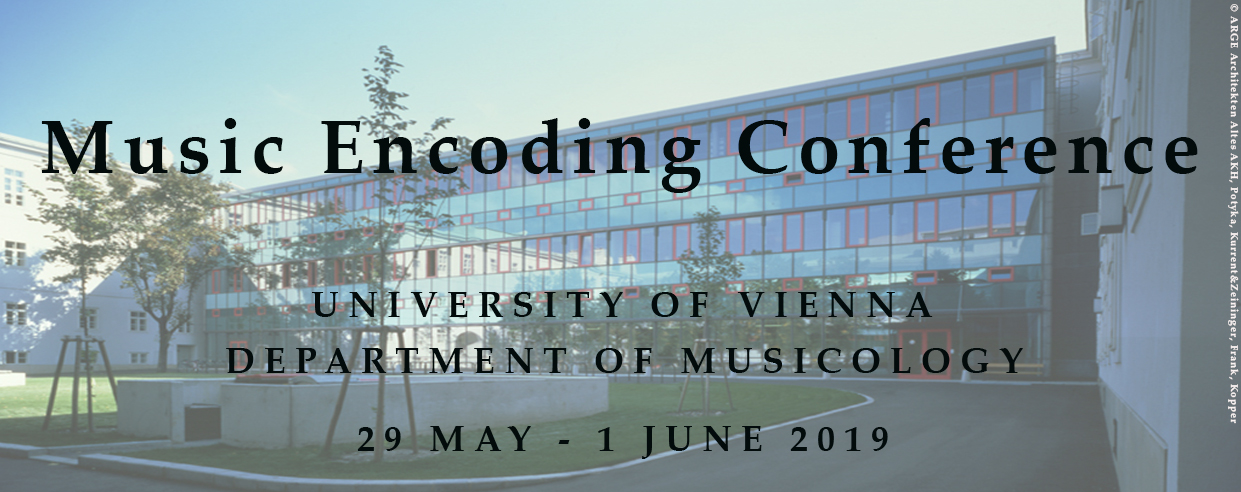
The Music Encoding Conference 2019 calls for paper, poster, panel, and workshop proposals to be submitted by 7 December 2018 16 December 2018.
The seventh Music Encoding Conference will take place in 2019, continuing this key annual event for dissemination and discussion for those working with, and on, music encoding.
The 2019 conference will be held in the beautiful and culturally rich city of Vienna, Austria, jointly organised by the Austrian Academy of Sciences, the Department of Musicology at the University of Vienna and the Mozart Institute of the Mozarteum Foundation Salzburg, on behalf of the Music Encoding Initiative community. The conference will be hosted at the University of Vienna over four days, with pre-conference workshops on Wednesday 29 May, the formal programme on Thursday 30 and Friday 31 May, and an ‘unconference’ on Saturday 1 June.
Date: 30 - 31 May (with pre-conference workshops on 29 May and an ‘un-conference’ day on 1 June)
Location: Institute of Musicology, University of Vienna, Austria
Registration: open until May 20
New Deadline for Proposals: 16 December 2018 (deadline is midnight, Vienna UTC+1)
Notification of Acceptance: 25 January 2019
Poster Size: DIN A0 (841 x 1189 mm or 33.1 x 46.8 inches), portrait format
For further questions, please e-mail mec@oeaw.ac.at
When using and manipulating digital music information, the properties and behaviours of its encoding are of fundamental importance - be that for musicological study, music theory, production of digital editions, composition, performance, teaching and learning, cataloguing, symbolic music information retrieval and recommendation, or more general electronic presentation of musical material and associated narratives. The study of music encoding and its applications is therefore a critical foundation for the use of music information by scholars, librarians, publishers, and the wider music industry.
The Music Encoding Conference has emerged as the foremost international forum where researchers and practitioners from across these diverse fields can meet and explore new developments in music encoding and its use. The Conference celebrates a multidisciplinary programme, combining the latest advances from established music encodings, novel technical proposals and encoding extensions, and the presentation or evaluation of new practical applications of music encoding (e.g. in academic study, libraries, editions, commercial products).
Pre-conference workshops provide an opportunity to quickly engage with best practice in the community. Newcomers are encouraged to submit to the main programme with articulations of the potential for music encoding in their work, highlighting strengths and weaknesses of existing approaches within this context. Following the formal programme, on Saturday 1 June, an unconference session fosters collaboration in the community through the meeting of Interest Groups, and self-selected discussions on hot topics that emerge during the conference.
The programme welcomes contributions from all those working on, or with, any music encoding. In addition, the Conference serves as a focus event for the Music Encoding Initiative community, with its annual community meeting scheduled the day following the main programme, on Saturday 1 June.
The conference welcomes contributions from all those who are developing or applying music encodings in their work and research. Topics include, but are not limited to:
and the use or application of music encodings in:
The Music Encoding Conference 2019 calls for paper, poster, panel, and workshop proposals. All submissions will be reviewed by 2-3 members of the programme committee before acceptance.
Authors are invited to upload their anonymized submission for review to our Conftool website: www.conftool.net/music-encoding2019
The deadline for all submissions is 16 December 2018 (see IMPORTANT DATES above). Conftool accepts abstracts as PDF files only. The submission to Conftool must include:
Paper and poster proposals must include an abstract of no more than 1000 words. Relevant bibliographic references may be included above this limit (i.e. will not be counted within the 1000 word limit). Please also include a short statement regarding your current interests related to music encoding.
Panel discussion proposal abstracts must be no longer than 2000 words, and describe the topic and nature of the discussion, along with short biographies of the participants. Panel discussions are not expected to be a set of papers which could otherwise be submitted as individual papers.
Proposals for half- or full-day pre-conference workshops, to be held on May 29th, should include the workshop’s proposed duration, as well as its logistical and technical requirements.
The maximum size for the posters is DIN A0, which is 841 x 1189 mm or 33.1 x 46.8 inches. Please use portrait format for your posters!
If you have any questions, please e-mail mec@oeaw.ac.at.